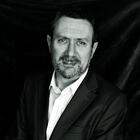
Luisgé Martín (Madrid, 1962) has a degree in Hispanic Philology from the Complutense University of Madrid and an MBA from the Instituto de Empresa. He has been awarded the Ramón Gómez de la Serna Prize for narrative, the Antonio Machado and Vargas Llosa Prize for short stories, and the Llanes Prize for Travel. In Anagrama he has published the novels The Shadow Woman, unanimously received as a masterpiece: «A great book. Uncomfortable. Brave» (Marta Sanz); «An unexpected way of facing walks along the edge of the abyss» (Enrique Turpin, La Vanguardia); «Interrupting reading is as hard as not looking at the crashed car on the shoulder» (Rafael Reig); «Luisgé Martín's skill is to have managed to ensure that the conditions of the horrible do not provoke frontal rejection in the reader by nurturing a good novel» (J. M. Pozuelo Yvancos, ABC); «A beautiful and difficult love story» (Javier Goñi, Mercurio); The same city: «A splendid psychological and existentialist novel about a man who takes advantage of 9/11 to change his identity» (Ángel Basanta, El Mundo); «A story of adventures, of the greatest adventure that we can all experience: that of changing our lives» (Vicente Molina Foix, Tiempo); "Pride. We are delighted that he continues walking through the darkest side of that strange thing that is life” (Bernardo M. Briz, Shanguide); and The Wrong Life: "A powerful investigation into the broken life" (Francisco Solano, El País); «The resounding questions about life, identity and death are faced seriously» (Nadal Suau, El Mundo), as well as the autobiographical book El amor del otro: «Of an admirable human density... A book like the one by Luisgé Martín would be superfluous in a world more affectionate than ours, where there was respect and where people were allowed to live, love and develop in peace" (Fernando Aramburu). "Memorable. The story that Luisgé Martín tells makes love, sexual desire and morality appear in a new light that concerns us all. The best book I have read in a long time" (Anna Caballé, El País).




